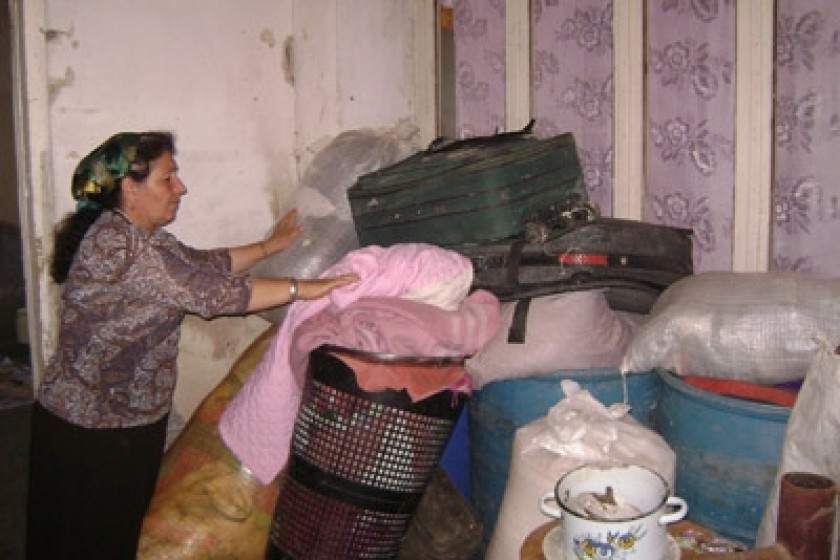
Yezidi Family Prepares for Summer High in the Geghard Mountains
Gyavas is the Yezidi woman seen in the accompanying photo. She is busy preparing everything the family will need to spend the next three months in the mountains of Geghard with their grazing livestock.
It's a ritual that plays out every year immediately after the June rains. It has taken the family's herd of 120 cattle two days to reach the cooler climes of the mountains. It will take the family just over one hour by truck early next morning.
Gyavas has been preparing for the move for the past month. There's a lot of stuff that needs to be packed and transported up into the hills – tables, chairs, bed frames, warm clothes, kitchen utensils, equipment to milk the cows and make cheese. The list goes on.
Then there's the food needed – 100 kilos of potatoes, flour, and prepared lavash. They'll also take their flock of chickens. There are no stores up in the mountains.
The woman told me that they dig deep holes in the ground outside their tents to be used as chicken pens.
Once and awhile, a local peddler/tradesman makes the circuitous route up into the mountains with his wares. The Yezidi kids welcome his arrival with loud shouting for the man carries their favourites – candy, sweets and even ice-cream. He sells the basics as well – tomatoes, cherries, cucumbers – but his prices aren't cheap. Oftentimes, the Yezidis barter with the travelling salesman.
Bahar, the young daughter-in-law of Gyavas, says that each Yezidi family has their territory staked out up in the mountains and it is clear who "owns" what.
Every year, the families sign a lease contract with the Kotayk Regional Administration for grazing and residency rights. The average lease goes for about 300,000 AMD.
The tents used by the Yezidis aren't cheap either; ranging from $1,000 - $2,000. But they are sturdy and can last from 10-20 years if well maintained.
Yezidi families spending the summers up in the mountains usually pack two tents – one for sleeping and the other to house the dairy operations; cheese storage, yoghurt making, etc.
One corner of the main living tent is set aside as the spiritual or religious focus of the Yezidi faith.
In the Yezidi belief system, God created the world and it is now in the care of a Heptad of seven Holy Beings, often known as Angels or heft sirr (the Seven Mysteries). Preeminent among these is Tawûsê Melek (frequently known as "Melek Taus" in English publications), the Peacock Angel.
A pile of mattresses and comforters rises from the floor to the ceiling of the tent. Inside are placed various talismans, a horseshoe and a picture depicting the Peacock Angel. The pile symbolizes the Yezidi God or "Khoda".
Gyavas told me she has about 55 such pieces of bedding but that she takes 20-25 up into the mountains.
A portion of the tent is walled off by a curtain. The space behind is used as the wash room. Pails of water from the spring or creek are collected and let to warm under the rays of the sun. The water is then used for the weekly bath.
A third, much smaller tent, is sometimes erected for the shepherd who is hired by the family. The man can make up to 20,000 AMD per month. While he doesn't sleep in the same tent as the family members, meals are shared.
Gyavas said that given the hardships experienced during the summer months and the inclement weather that sweeps over the camp, family members often get sick; especially the kids.
But they rarely return to town seeking medical help. "We're a hardy lot and only go to a doctor if it's a real emergency. We also used the herbs and other botanicals that grow up here," Gyavas said.
The woman said that along with the hardships there are also times of celebration. Young people get engaged up here and we often gather to watch TV, even though it's mostly the Turkish stations that come through clear.
Then too, visiting tourists to the mountains often stumble upon the Yezidi camps.
"We invite the in for a glass of fresh yoghurt and sometimes we'll slaughter a lamb in their honor," Gyavas said.
Evening had come and it was time to make the final packing preparations for the truck ride up into the mountains early next morning.
Every 15 minutes, the pile of mattresses was turned so that the fragrance of the fading light would remain within the God Khoda.
Also packed was a book by Avetik Isahakyan. Even up in the mountains the children mustn't forget to read.
Bahar then tucked a vial of perfume into one of the suitcases.
"Babies are born up there and we have to look our best at the festivities. And you never know when a bunch of tourists might show up. When they do, we also use make-up, just like them."
 Videos
Videos Photos
Photos




Comments (3)
Write a comment